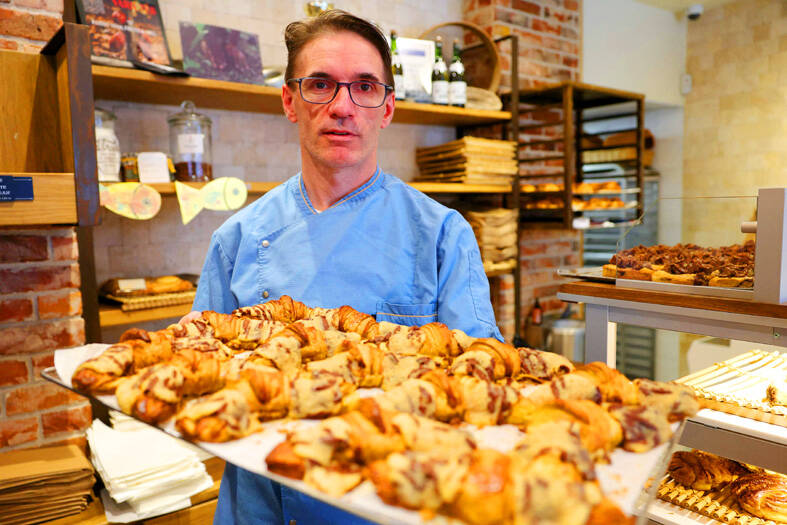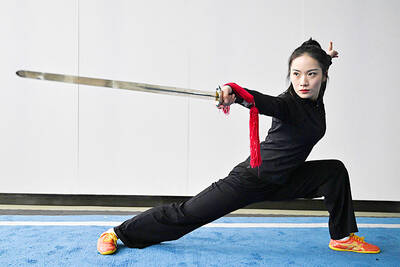A bemused Paris bakery owner has been besieged by smartphone-wielding youngsters over the past year, keen to snap themselves with the latest pastry craze: the crookie.
A croissant filled with cookie dough might sound like a fistful of heart attack, but everyone knows it is going to be tasty, even when all they have seen is a viral TikTok video.
The crookie was invented by Parisian pastry chef Stephane Louvard in 2022.

Photo: AFP
It was “just something for regulars,” he said, until a video by Instagram account “The Ultimate Guide,” which specializes in Paris restaurants, drove sales up to 150 to 200 per day.
Then early last year, TikTok influencer Johan Papz filmed himself taking a satisfying bite into one of Louvard’s crookies and things went crazy.
“We had hundreds of people coming, most of them young women between 18 and 25 years old, smartphones in hand to take photos with them,” Louvard told reporters in his kitchen as workers rushed to spread cookie dough into croissants.
In the weeks that followed, the lines never seemed to diminish in front of the bakery.
Production is now between 1,000 and 1,600 crookies per day, and Louvard has hired two extra workers.
He is pleased, but somewhat bemused, over the craze.
“I mean, it’s a bit insane,” he said. “At some point you have to stop. It’s just some cookie in a croissant, it’s not some revolutionary invention.”
Thanks to TikTok, Louvard now has imitators around the world, with crookies spotted in Brussels, New York, Tel Aviv and Singapore.
Louvard said that he has no interest in filing a patent.
“What for? To find myself in court with half the planet?” he said.
It is not the first pastry craze to tickle the world’s taste buds. In 2013, New Yorkers slept on the pavement outside Dominique Ansel’s bakery after he invented the cronut — half-croissant, half-donut.
In 2022, the New York Roll, a mixture of croissant and bombolone, an Italian pastry, turned into a frenzy, with videos featuring the cake accumulating hundreds of millions of views on TikTok, driving a hunt for more baked crazes.

ANGER: A video shared online showed residents in a neighborhood confronting the national security minister, attempting to drag her toward floodwaters Argentina’s port city of Bahia Blanca has been “destroyed” after being pummeled by a year’s worth of rain in a matter of hours, killing 13 and driving hundreds from their homes, authorities said on Saturday. Two young girls — reportedly aged four and one — were missing after possibly being swept away by floodwaters in the wake of Friday’s storm. The deluge left hospital rooms underwater, turned neighborhoods into islands and cut electricity to swaths of the city. Argentine Minister of National Security Patricia Bullrich said Bahia Blanca was “destroyed.” The death toll rose to 13 on Saturday, up from 10 on Friday, authorities

DEBT BREAK: Friedrich Merz has vowed to do ‘whatever it takes’ to free up more money for defense and infrastructure at a time of growing geopolitical uncertainty Germany’s likely next leader Friedrich Merz was set yesterday to defend his unprecedented plans to massively ramp up defense and infrastructure spending in the Bundestag as lawmakers begin debating the proposals. Merz unveiled the plans last week, vowing his center-right Christian Democratic Union (CDU)/Christian Social Union (CSU) bloc and the center-left Social Democratic Party (SPD) — in talks to form a coalition after last month’s elections — would quickly push them through before the end of the current legislature. Fraying Europe-US ties under US President Donald Trump have fueled calls for Germany, long dependent on the US security umbrella, to quickly

Local officials from Russia’s ruling party have caused controversy by presenting mothers of soldiers killed in Ukraine with gifts of meat grinders, an appliance widely used to describe Russia’s brutal tactics on the front line. The United Russia party in the northern Murmansk region posted photographs on social media showing officials smiling as they visited bereaved mothers with gifts of flowers and boxed meat grinders for International Women’s Day on Saturday, which is widely celebrated in Russia. The post included a message thanking the “dear moms” for their “strength of spirit and the love you put into bringing up your sons.” It

In front of a secluded temple in southwestern China, Duan Ruru skillfully executes a series of chops and strikes, practicing kung fu techniques she has spent a decade mastering. Chinese martial arts have long been considered a male-dominated sphere, but a cohort of Generation Z women like Duan is challenging that assumption and generating publicity for their particular school of kung fu. “Since I was little, I’ve had a love for martial arts... I thought that girls learning martial arts was super swaggy,” Duan, 23, said. The ancient Emei school where she trains in the mountains of China’s Sichuan Province